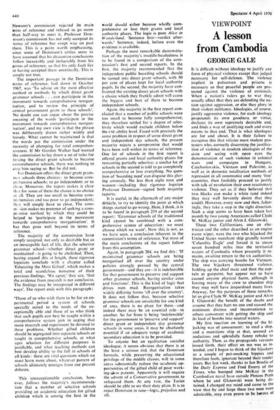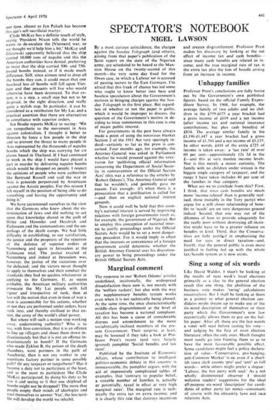VIEWPOINT
A lesson from Cambodia
GEORGE GALE
It is difficult without ideology to justify any form of physical violence except that judged necessary for self-defence. The violence implicit in policemen and prisons is necessary so that peaceful people are pro- tected against the violence of criminals. When a nation's rulers go to war they usually affect that they are defending the na- tion against aggression, or else they glory in their violent militancy. Ideologies, of course, justify aggressive violence, for each ideology propounds its own goodness or virtue, declares its own supremely desirable end, and finds a way of justifying each and every means to that end. That is what ideologies are for and about. It is their failure to recognise this that vitiates most student pro- testers who, correctly discerning the justifica- tion of violence in modern ideologies of the state and seeing with open eyes the demonstration of such violence in colonial wars and campaigns in Hungary, Czechoslovakia, Vietnam and Palestine, as well as in domestic totalitarian methods of repression in all communist and many 'free' countries, then foolishly proceed to justify with talk of revolution their own reactionary violence. They act as if they believed that two blacks can make a white (and indeed they may well fervently desire that they could). However, every now and then, falter- ingly, they take a step in the right direction. Such a step seems to have been taken last month by two young Americans called Clyde W. McKay junior and Alvin J. Glatowski.
These two Californians, one an elec- trician and the other described as an engine room wiper, were the two who hijacked the United States merchant ship grandly named 'Columbia Eagle' and forced it to steam seven hundred miles into the territorial waters of Cambodia where presently it re- mains, awaiting return to the us authorities. The ship was carrying bombs for Vietnam. The two hijackers threatened violence, holding up the chief mate and then the cap- tain at gunpoint, but appear not to have caused anyone physical harm, although in forcing many of the crew to abandon ship they may well have jeopardised many lives. Anyway, for the purposes of these remarks, let us give Clyde W. McKay, junior and Alvin J. Glatoinki the benefit of the doubt and assume that they hurt no one and caused the minimum distress and inconvenience to others consonant with getting the ship and its load of bombs into neutral waters.
My first reaction on learning of the hi- jacking was of amusement: to steal a ship, and a munitions ship at that, seemed an audacious and splendidly funny rebuke to authority. Then, as the propaganda versions issued forth, their effect on me was as in- tended, and I began to think of the hijackers as a couple of pot-smoking hippies and therefore fools, ignorant beyond their tender years. But last week, thanks to Ian Brodie of the Daily Express and Fred Emery of the Times, who bumped into McKay in the Cambodian naval base outside Phnom Penh where he and Glatowski were being de- tained, I changed my mind and came to the view that by and large these two men were admirable, may even prove to be heroes of our time, almost as Jan Palach has become this age's self-sacrificial martyr.
Clyde McKay has a definite touch of style, saying 'President Nixon tells the world he wants to de-escalate the [Vietnam] war, so we thought we'd help him a bit.' McKay and Glatowski apparently believed that the ship carried 10,000 tons of napalm and this the American authorities have denied, preferring to insist that the ship carried 500- and 750- pound bombs instead, as if it made much difference. Still, since airmen tend to drop all the bombs they can, it could mean that one boatload less of bombs will fall upon Viet- nam and that peasants will live who would otherwise have been destroyed. To that ex- tent. it is a step, a small step but not to be despised, in the right direction, and really quite a stylish step. In particular, it can be considered as a retribution for My Lai, and a practical assertion that there are alternatives to compliance with superior. orders. Ian Brodie reports McKay as saying: 'We are sympathetic to the movement in Asia against colonialism. I thought it better to threaten by force a few people in the ship and so prevent the threat to many people in Asia represented by the thousands of napalm bombs which the ship was carrying for us planes based in Thailand. If I had continued to work in the ship I would have played a part in murder by delivering napalm bombs which would be dropped on people. I respect the opinions of people who were authorities like Bertrand Russell and said the war in Asia is genocide perpetrated by Americans against the Asiatic peoples. For this reason I felt myself in the position of being able to do something and having the opportunity and doing it.'
We have accustomed ourselves to the view that the Germans who knew about the ex- termination of Jews and did nothing to act upon that knowledge shared in the guilt of Hitler and Himmler and Heydrich and Eichmann and the commandants and the un- derlings of the death camps. We had little difficulty in establishing, to our satisfaction, the justice and the propriety of the rejection of the defence of superior orders at Nuremberg and again in Jerusalem at the Eichmann trial. The justice exacted at Nuremberg and indeed at Jerusalem was, however, the justice of the victorious over the defeated; and the victors never thought to apply to themselves and their conduct the standards they had no qualms whatsoever in applying to the Germans. If, as seems probable, the American military authorities prosecute the My Lai people with full vigour and irrespective of rank, then at last will the notion that even in time of war a man is accountable for his actions, whether or not they are performed under orders. have sunk into, and thereby civilised to that ex- tent. the army of the world's chief power.
But where will such a notion stop working away, undermining authority? Who is to say, with firm conviction, that it is an offence to line up villagers and shoot them down in- discriminately but that it is not an offence in- discriminately to bomb? If the Germans who made Zyklon B, the poison of the death chambers, were partners in the guilt of Auschwitz., then is not any worker in any munitions factory partner in some possible guilt? Or any taxpayer or taxgatherer? Has it become a duty not to participate at the least, and at the most to participate like Clyde McKay participated, by doing his duty as he saw it and seeing to it that one shipload of bombs might not be dropped? The more that People empty their minds of ideologies and steel themselves to answer 'Yes', the less terri- ble will develop the world we inhabit.



































 Previous page
Previous page